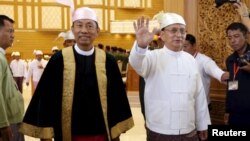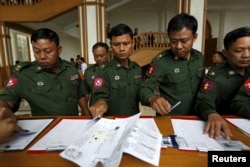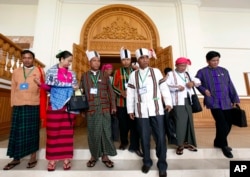Myanmar President Thein Sein struck a conciliatory tone Thursday in what is likely his last address to a military-dominated parliament before Aung San Suu Kyi's pro-democracy party takes control February 1.
Thein Sein hailed the "triumph" of Myanmar's transition of power and urged political parties to work together for the good of the country, which is also known as Burma. He also said he would help longtime pro-democracy activist Aung San Suu Kyi's government succeed.
"Even though there were difficulties and challenges, we were able to bring a democratic transformation eventually," Thein Sein said. "This is a triumph for all Myanmar's people."
During his speech to lawmakers, whose five-year terms expire on Friday, the president outlined many of the sweeping political and economic reforms his government has accomplished in the past five years.
Reforms
Thein Sein, who came to power in 2011, has released political prisoners, scrapped censorship, legalized trade unions and protests, sought peace with ethnic minority insurgents, and pushed through legislation on everything from land reform to foreign investment.
However, his greatest achievement might be his administration's ability to organize and conduct credible elections in November that were praised by international observers, as well as his work on the transfer of power to Nobel Peace Prize winner Aung San Suu Kyi's National League for Democracy (NLD).
In 1990, the NLD was elected in a landslide, but those results were ignored by a junta that tightened its grip on power for two more decades.
Thein Sein on Thursday said he had not supported reforms in order to hold on to power.
"During the last five years we have built a better foundation for the next government, who won the 2015 election. I did not do this with the expectation of being a second-term president," said Thein Sein, under whose leadership the impoverished nation of 51.5 million people has transformed from a pariah state into one of the world's fastest-growing economies.
"As the winning party needs to work for the national interest, the minority parties also need to cooperate and, sometimes, criticize if necessary for the country," said the 70-year-old president whose term expires at the end of March. "Our government will help the new government."
Parliament
However, Myanmar's army retains major clout -- they maintain a quarter of parliamentary seats.
Meanwhile, the new NLD-dominated parliament, which convenes on Monday, will pick its speakers and other key positions in the chamber before electing a president over the next few weeks.
Aung San Suu Kyi is barred from the presidency. The junta-drafted constitution prevents people with foreign spouses or children from doing so. She has two sons with British citizenship.
For her part, wildly popular Aung San Suu Kyi has said she will not press for an immediate change to the constitution, and will appoint a ceremonial head of state, a senior official in her party said earlier this month.
The pro-democracy activist also said she will include in the new cabinet at least one member of the military-linked Union Solidarity and Development Party (USDP), which was trounced in the November election, as well as members from ethnic minorities who have complained of being sidelined from power.
National League for Democracy executive Win Thein told reporters Thursday that it will nominate a member of the Burman ethnic majority for lower house speaker and an ethnic Kachin for his deputy. It will propose a Karen for speaker of the upper house, and an Arakanese for his deputy. The proposed deputies come from other parties.
Some material for this report came from AP, AFP and Reuters.










